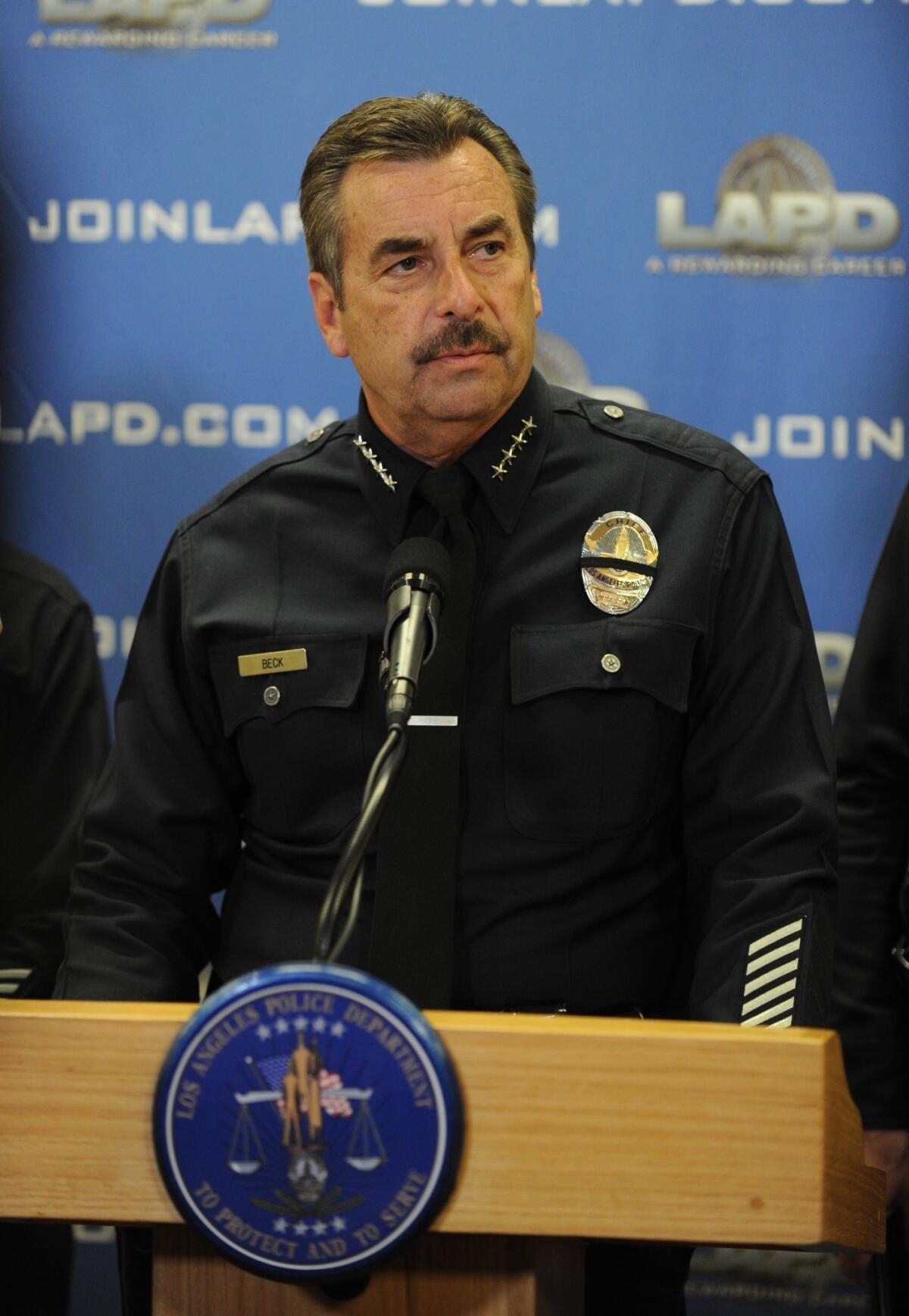Did Chief Beck put his finger on the scale?

- Share via
Whenever there is an officer-involved shooting, we are reflexively asked to withhold judgment until all the evidence comes out. So it is somewhat disconcerting for LAPD Chief Charlie Beck, in providing the first detailed account of the shooting of Margie Carranza and Emma Hernandez in Torrance, to tell the Times in an interview that they were the victims of “a tragic misinterpretation” by officers working under “incredible tension.”
We all know the officers made a mistake, or a series of them as the manhunt for Christopher Jordan Dorner unfolded Thursday, but the question is whether their behavior was excusable or not, and whether additional training or even punishment is warranted for the officers, and whether new or better policies and training are needed for all officers. When Beck says that it’s not difficult to imagine how officers who were already on edge could make the mistake these officers did, even if he is not commenting directly on this shooting, he risks, suggesting that he has prejudged their behavior as excusable, a suggestion that is particularly troubling for those who live in communities where officer-involved shootings happen regularly.
The public has a right to a full and impartial investigation and an accounting of what happened before judgment is rendered. That’s a basic, first principle, and Beck should do nothing to suggest any deviation from it.
FULL COVERAGE: The manhunt for Christopher Dorner
As Beck acknowledged, the investigation that will attempt to provide this accounting is still in its early stages. Investigators have yet to collect all the evidence and piece together what happened.
The public has yet to be told basic facts: the number of officers involved, the kind of weapons they used, the number of bullets fired, the kind of verbal warnings, if any, provided before they opened fire, and whether the officers remain on active duty. The public has yet to be told, more fundamentally, how officers could open fire on a vehicle that didn’t match the make, color or license plate of the vehicle driven by Christopher Dorner.
We know, in general, that law enforcement officers face many dangerous and stressful situations in the line of duty. Here, the officers, guarding the home of a high-ranking LAPD police official, and on the lookout for Dorner, faced a stressful situation when told he might be heading their way. But how did this stress so cloud their judgment that they opened fire mistakenly, spraying surrounding houses and cars with bullets, and what does this say about the training officers receive to handle the duress of being thrust into a potentially life-threatening situation and to still make critical decisions?
TIMELINE: Manhunt underway for ex-LAPD officer suspected of multiple shootings
Before the facts have been gathered, and the relevant questions answered, Beck must resist the urge to put his thumb on the scale of public opinion. It is natural that he should want to support his officers and department, but his leadership now, as a public official, is what’s most important. When it comes to this shooting, he must be focused single-mindedly on promising and delivering a timely and thorough investigation that provides full disclosure and permits public scrutiny and accountability.
We are a long way from a department and a chief who would defiantly circle the wagons and deny any and all wrongdoing, but Beck risks damaging those gains by creating the impression that public relations in any way could take precedence over public accountability. The decision to use deadly force is the most critical one that a law enforcement officer will ever make, and the department’s investigation into that decision must be treated as the most important the department will ever undertake. Any failure in this regard would confirm the worst suspicions of those who remain unconvinced that the department has truly reformed itself.
Beck and his predecessor have worked to allay many of the fears and anxieties that Los Angeles citizens experienced about the police department during the terrible decades when the LAPD functioned as a paramilitary force and treated our most vulnerable communities as the enemy. Beck has done this by insisting on the unvarnished truth as part of implementing policies he correctly characterizes as “constitutional policing.” Now, in this moment of heightened scrutiny, is the time to reaffirm this commitment.
Hector Villagra is executive director of the ACLU of Southern California.
More to Read
A cure for the common opinion
Get thought-provoking perspectives with our weekly newsletter.
You may occasionally receive promotional content from the Los Angeles Times.






